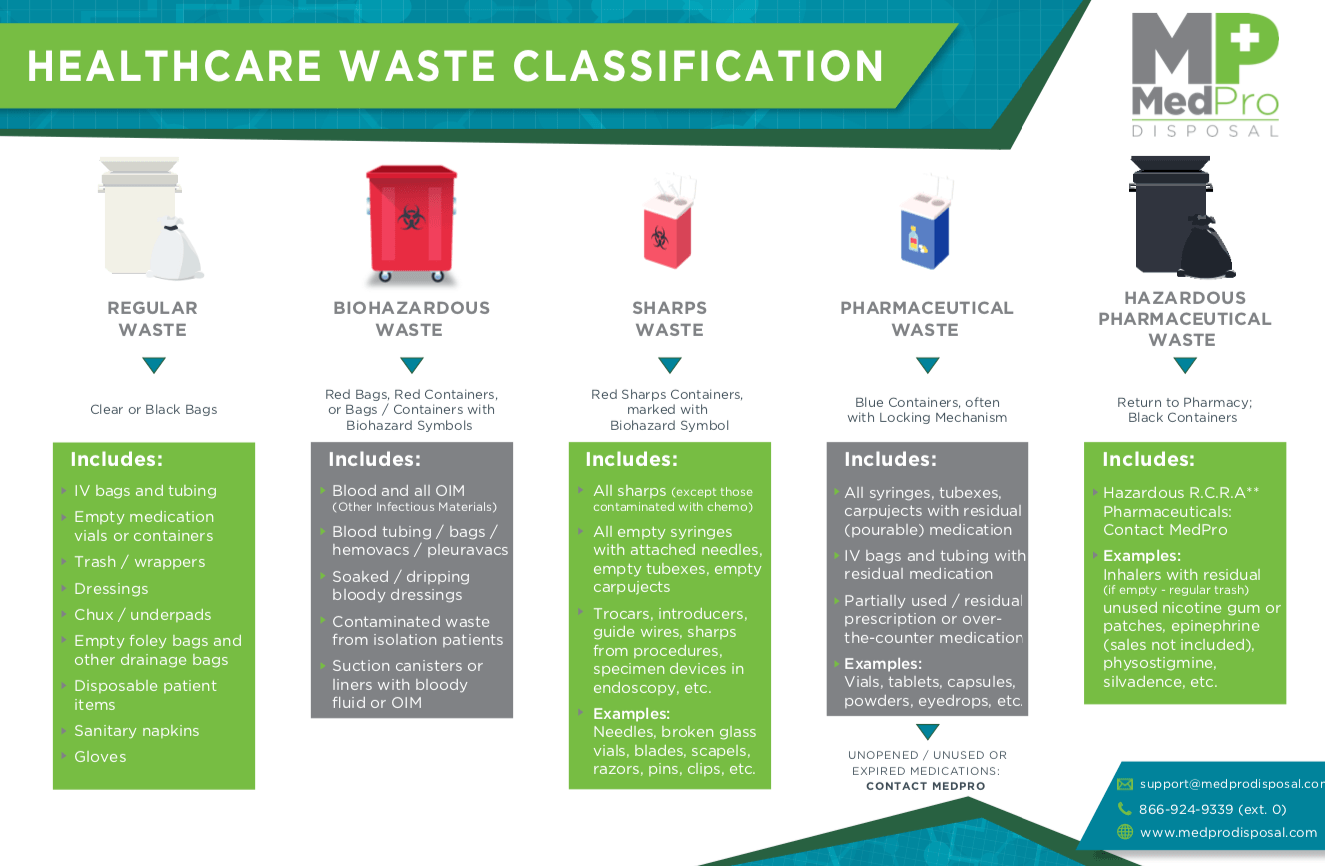Safe and Secure: The Definitive Selection for Professional Medical Waste Removal Services
Safe and Secure: The Definitive Selection for Professional Medical Waste Removal Services
Blog Article
The Significance of Appropriate Waste Disposal Practices
From the consequences of improper waste disposal on our setting to the lasting effects for future generations, the importance of adopting sustainable waste monitoring techniques can not be overemphasized. By discovering the ecological effect of reckless waste disposal, the benefits of recycling initiatives, and the significance of community interaction in waste decrease initiatives, a much deeper understanding of why appropriate waste disposal practices are important arises.
Environmental Impact of Improper Disposal
Inappropriate disposal of waste presents a substantial threat to the setting because of its destructive results on ecological communities and human health and wellness. When waste is not correctly handled, it can lead to pollution of the dirt, air, and water, creating damage to different plant and animal types. click here. Chemicals and contaminants from poorly disposed waste can leak into the ground, polluting groundwater sources and impacting the health and wellness of both wildlife and people
Moreover, the buildup of waste in land fills generates greenhouse gases like methane, contributing to environment modification and international warming. Improper disposal practices also lead to littering, which not only weakens the visual worth of the environment yet can also damage wild animals with consumption or complication.
To alleviate these ecological impacts, it is vital for people and areas to adopt proper garbage disposal practices such as reusing, composting, and responsible hazardous waste disposal. By taking these actions, we can aid shield environments, maintain natural deposits, and secure human health for future and existing generations.
Advantages of Recycling Programs
Routinely participating in reusing programs offers many advantages for both the setting and culture as a whole. This conservation of resources not just assists in keeping ecological equilibrium but also contributes to lasting advancement.
Furthermore, recycling plays a vital function in minimizing power usage and greenhouse gas exhausts. The manufacturing of products from recycled materials normally requires much less energy compared to making from virgin resources - medical waste removal service. Consequently, the carbon footprint related to the production procedure is significantly reduced, aiding in the fight against climate modification
In addition, reusing programs create work opportunities in the reusing market, promoting economic growth and social welfare. By urging the recycling and reuse of products, these programs sustain a circular economic situation that lessens waste generation and makes the most of source effectiveness, eventually bring about a cleaner, greener future for generations ahead.
Contaminated Materials Management Guidelines
Applying effective hazardous waste management standards is critical for decreasing environmental and wellness dangers connected with the inappropriate disposal of dangerous products - click here. Appropriate handling, treatment, and disposal of contaminated materials are important to prevent contamination of soil, water sources, and air
One key standard is correct labeling of hazardous waste containers to ensure safe handling and transport. In addition, centers have to abide by strict storage demands to prevent leakages, spills, or mishaps that can endanger human wellness and the environment. Routine training programs for staff members on unsafe waste management methods are additionally important to ensure conformity with laws and promote a culture of safety and security.
Furthermore, contaminated materials must be segregated based on its residential properties to prevent chain reactions that could bring about hazardous situations. Executing a detailed waste tracking system can help check the movement of hazardous materials from generation to disposal, making sure openness and accountability. By following these guidelines vigilantly, sectors and services can contribute to a safer and cleaner setting for present and future generations.
Area Participation in Waste Decrease
To successfully address the ecological and health risks linked with hazardous waste monitoring, engaging the community in waste decrease campaigns is extremely important. Community involvement plays a critical function in advertising sustainable waste management techniques and promoting a society of ecological obligation. By educating citizens regarding proper waste segregation, reusing, and composting techniques, communities can considerably minimize the quantity of waste sent out to garbage dumps, thus decreasing environmental contamination and preserving natural deposits.
Neighborhood involvement in waste reduction programs also aids in elevating understanding about the value of waste minimization and encourages individuals to take on eco-friendly habits in their lives - medical waste removal. Joint initiatives in between neighborhood authorities, waste management companies, and neighborhood members can result in the implementation of reliable waste reduction techniques tailored to the certain needs of each neighborhood or community
In addition, neighborhood involvement promotes a sense of possession and accountability among citizens, empowering them to take aggressive steps towards lowering waste generation and advertising a cleaner, healthier atmosphere for future and current generations. By interacting towards typical waste decrease objectives, communities can visit homepage make a significant effect on alleviating the negative effects of inappropriate waste disposal methods.

Future of Sustainable Waste Practices
The evolution of lasting waste techniques is essential for advancing environmental stewardship and source conservation in the coming years. As the global populace proceeds to grow, so does the quantity of waste produced (medical waste removal service). Typical waste disposal approaches, such as landfilling and incineration, are no longer sustainable in the lengthy term due to their considerable environmental influences. Moving on, the future of sustainable waste techniques exists in welcoming a circular economy technique, where resources are recycled, recycled, or repurposed to decrease waste generation.
Technical innovations play a key function in shaping the future of lasting waste methods. Advanced waste sorting and reusing innovations can assist improve the effectiveness of waste administration procedures, enabling the recuperation of valuable resources from waste streams. In addition, the adoption of eco-friendly products and composting methods can help in reducing the amount of organic waste winding up in land fills, consequently alleviating greenhouse gas emissions.
In addition, advertising customer recognition and education and learning on correct waste partition and disposal practices is essential for driving behavioral adjustment in the direction of sustainability. By promoting a society of waste reuse, recycling, and reduction, neighborhoods can jointly add to a cleaner and much healthier atmosphere for future generations.

Final Thought
Finally, appropriate garbage disposal techniques are critical for decreasing environmental effect and promoting sustainability. By executing recycling programs, taking care of contaminated materials appropriately, and motivating community involvement in waste decrease efforts, we can work in the direction of a cleaner and healthier environment. It is necessary for federal governments, organizations, and people to prioritize sustainable waste practices for the future health of our earth.
.jpg)
From the consequences of incorrect waste disposal on our setting to the lasting ramifications for future generations, the importance of adopting lasting waste administration techniques can not be overstated. By exploring the ecological effect of irresponsible waste disposal, the advantages of reusing campaigns, and the significance of area interaction in waste reduction efforts, a deeper understanding of why appropriate waste disposal practices are vital emerges.
By educating residents about appropriate waste segregation, recycling, and composting techniques, neighborhoods can considerably minimize the amount of waste sent out to garbage dumps, consequently reducing environmental air pollution and saving all-natural resources. (click here)
Relocating onward, the future of lasting waste methods lies in welcoming a round economic situation method, where sources are reused, reused, or repurposed to lessen waste generation.
Advanced waste sorting and recycling technologies can help improve the effectiveness of waste monitoring procedures, permitting for the recuperation of important resources from waste streams.
Report this page